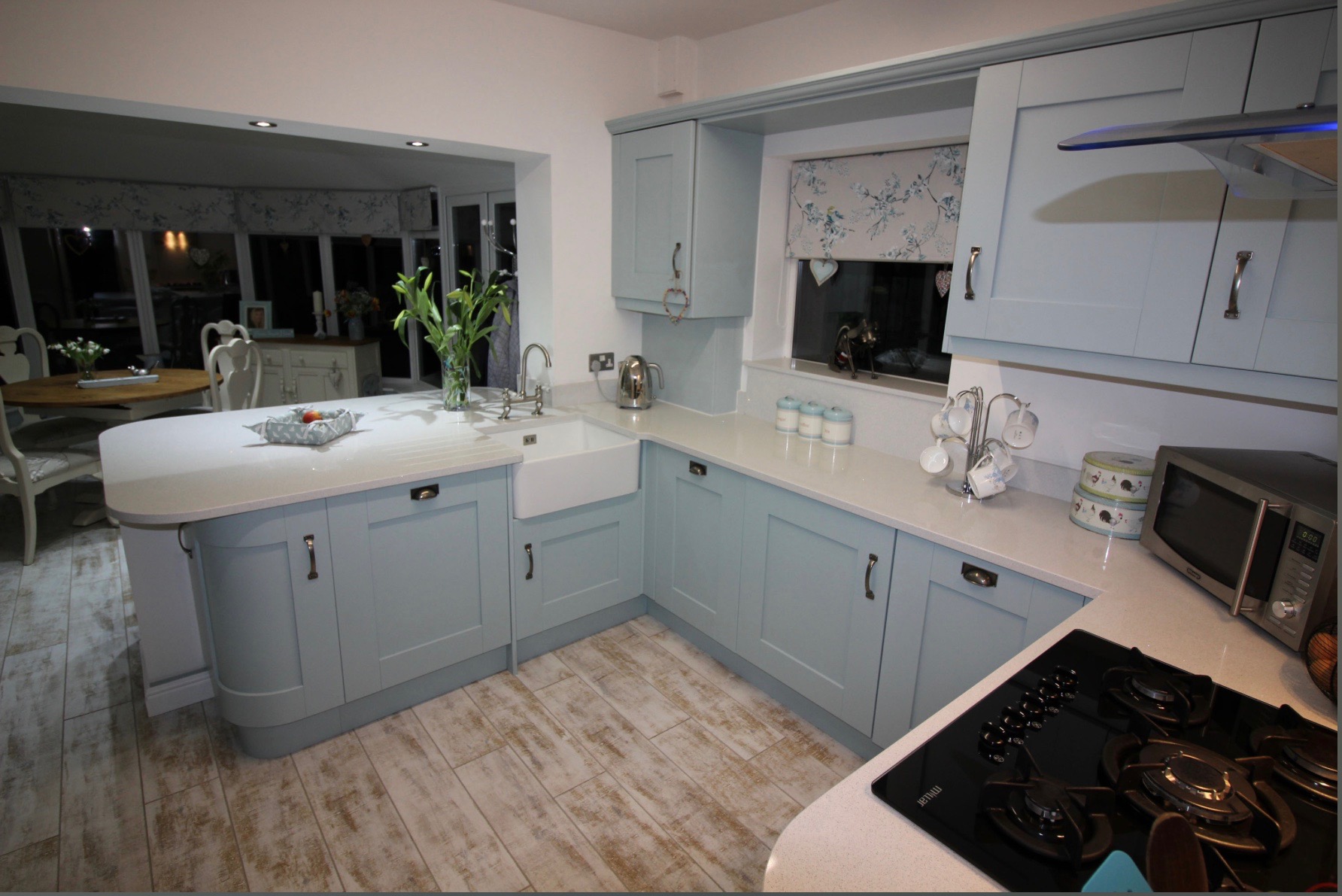Stunning quartz worktops are the ultimate design statement for many a kitchen. If you’ve invested your hard-earned cash in quartz countertops, the last thing you want is to damage them. To keep your counters looking shiny and new, avoiding unsightly stains and scratches, you’ll have to be careful about how you treat them.
Though this may sound daunting, looking after quartz counters is actually quite simple. Resin-bound quartz is far more resistant than comparable worktop materials like granite and marble. Its durable nature means that accidentally staining or scratching the surface is difficult if you’re following the appropriate maintenance habits.
To help you get the best out of your quartz kitchen worktops for many years to come, this blog from Kitchen Warehouse covers everything you need to know about taking care of quartz counters. From regular cleaning rules to stain removal and what to do if damage does occur, you’ll find a treasure trove of useful tips below.
Daily quartz worktop cleaning routine
Quartz kitchen counters are relatively low maintenance. All you need to do to keep them looking good is get into a regular cleaning routine. You should be wiping up any spillages when they happen, before anything has a chance to stick, harden, or stain. If you do this, the process of cleaning your quartz worktops every day will be quick and easy.
A simple solution of warm water and dish soap does the job just fine. Use a spray bottle to lightly coat the surfaces, then wipe them down to clean off the mixture with a soft cloth. Never use abrasive scouring pads or scrubbing brushes – a microfibre cloth won’t scratch or leave streaks. Don’t use hot or boiling water, either, as this can affect the resin in the quartz countertop.
When you prepare food on the worktops, they can become a breeding ground for bacteria. It’s important to also disinfect these surfaces as well as wiping them clean. At least twice a week, you should use a quartz-safe disinfectant spray and wipe the residue away. Don’t use bleach or disinfectant wipes, as these can damage and discolour the quartz worktops.
If you want to make your own antibacterial cleaning solution, you can dilute white vinegar with warm water. This should help to lift stubborn messes when a deeper clean is required. To make sure that you never miss a spot, look at each counter from different angles. If you crouch down and look across the worktops at eye level, you might notice something you didn’t see from above.
How to make quartz countertops shine
One of the many aesthetic benefits of quartz kitchen worktops are their polished finish. This lustre should last for years – the main reason that quartz counters become dull is just a lack of cleaning. Using the wrong soap, including oil-based products, can leave a thin greasy film on the surface. This is why it’s important to clean the counters properly every day.
Similarly, quartz worktops can become cloudy from discolouration if you use harsh chemicals on them. This kind of damage is unfortunately irreversible, so be very careful with what you use to clean and polish your quartz countertops. After thoroughly cleaning off the surfaces, buffing in circles with a clean and dry cloth should bring back the shine.
Again, cleaning with a vinegar and water mixture before buffing with a dry cloth can work wonders. There shouldn’t be any streaks or residue, and your counters should be literally sparkling clean. Some people like to use window cleaning sprays meant for glass, but you should always check that any product is safe to use on a quartz worktop before applying it.
You don’t actually need to use polish on your counters, like you might with wood or different types of stone. Varnishes and oils that are meant to add a glossy sheen won’t work on quartz kitchen worktops, as they’re supposed to sink into the material. Since quartz is non-porous, these products won’t absorb into the counters, and will just build up on the surface.
How to remove stains from quartz worktops
While quartz is a very stain-resistant material, it’s not completely stain-proof. Bound by resin, quartz counters become non-porous – but if certain chemicals come into contact with them, they can react with the resin. Anything too acidic or too alkaline will damage the surface, and this can be extremely difficult to fix – if it can be fixed at all.
As long as you use common sense and clean up after cooking, and follow your daily cleaning routine, there shouldn’t be any stains left to form. If you haven’t cleaned properly and there are stubborn marks or water stains, these can usually be scrubbed off with a cloth dipped in water and vinegar. Even for tough cooking grease, try to avoid using oily or acidic degreasers.
If it’s a stubborn food stain that’s dried into a crust, you may be able to scrape it off using a plastic palette knife or spatula. Never use an actual sharp knife or razor blade, as this can scratch and chip the quartz worktop surface. Removing most of the substance this way should make it easier to clean up any residue left behind after scraping as much of it off as possible.
For spills and stains like this that are truly caked on, avoid the temptation to attack them with abrasive tools. Instead, soak a cloth in a mixture of warm water and vinegar and then place it over the stain. Allow it to soak for 10-15 minutes, and when you come back, you should be able to scrape it away. Be sure to rinse any residue off the counter and wipe it dry.
How to fix scratches in quartz countertops
Durable quartz worktops are difficult to scratch, but being careless with sharp or abrasive objects can easily lead to scratching the surface. For example, cutting food directly on the counters instead of using a chopping board is a big no-no. However, we understand that accidents do happen – and if they do, it’s usually possible to fix small scratches, chips, or pits.
For light scratches, you should be able to gently polish them out using a grinder with a buffing pad. Always clean and dry the counter thoroughly first, and do the same afterwards. Buff the scratch lightly and evenly; pressing too hard can make the problem worse. If the scratch is deep enough to catch a fingernail on, or if it’s more of a chip, it’s likely that you’ll need to fill it in.
It’s possible to make a seamless repair using a resin filler or epoxy product. Whether you use superglue or a specialist resin, make sure that it’s suitable for quartz. Some such products are coloured, but it can be tricky to match the colour of your quartz counters exactly, so it’s best to avoid these. Purpose-made repair kits may also come with syringes to help you inject the filler.
Squeeze as much of the filler product into the scratch as possible, wiping away any excess, then allow it to dry for 24 hours. If the filler shrinks when dry, you may need to top it up and allow the next layer to dry. Once it’s done, you can carefully scrape off any leftover substance and then clean and buff the quartz countertop until it’s smooth again. Unfortunately, if these quick fixes won’t work for a large chip or crack, it’s best to seek the advice of a professional. If they can’t repair the damage, you may face paying for new kitchen counters.
Top tips for taking care of quartz worktops
You’ve probably heard the old phrase that ‘prevention is better than cure’. This rings true for quartz countertops, as keeping them clean and being careful is the best way to maintain their condition. As we’ve discussed above, you should always clean up spills as soon as they occur, and dry off the counters properly after cleaning them.
Keep strong chemicals away from your quartz worktops, including solvents. Even everyday products like toothpaste or nail varnish remover can cause discolouration and pitting if left to break down the resin. For similar reasons, avoid using cleaning products like concentrated bleach or ammonia. While vinegar is acidic, it’s fine to use it when diluted in water.
If you’re wary of using vinegar in the ways we’ve mentioned, you may want to use rubbing alcohol instead for disinfecting and removing tough stains. As long as you wipe away any residue afterwards, it shouldn’t damage the surface. Avoid applying oil or wax products, as these will just sit on the surface and cause it to appear dull and dirty.
Just as quartz counters are stain-resistant but not stain-proof, they’re also heat-resistant but not heat-proof. This means that you must avoid putting anything hot on them. To prevent the surface from discolouring or cracking, use trivets or protective mats for setting down pots and pans. You should also use coasters under cups, mugs, or glasses containing hot drinks.
Do you need to seal quartz worktops?
You may have heard about some people using sealants on other types of stone worktop. While materials like granite and marble do need sealing treatments, this is because they’re porous. As we’ve covered so far, quartz countertops are made with resin, which acts like a sealant in that it keeps almost everything from absorbing into the quartz.
Just like oils and waxes simply sit on top of the counter without sinking in, building up to form a greasy and dull-looking film, standard sealants just won’t work. It’s understandable that you might want the extra protection for added peace of mind, but it’s not necessary. You’ll only need a sealant if the surface is honed or textured, as these finishes are porous.
If you’ve got your heart set on sealing your quartz worktop anyway, be sure to use a sealant that’s specially designed for use on quartz counters. Do your research to find a suitable product for the specific type of quartz your worktops are made from – you can contact the manufacturer or the shop you bought them from for more information.
While we’re more into kitchen units and kitchen doors than countertops at Kitchen Warehouse, we’re always happy to discuss anything to do with kitchen design. If you’re looking for ideas to match quartz counters, why not browse our website or get in touch with our team for help? You can give us a call on 01765 640 000, or send an email to contact@kitchenwarehouseltd.com and we’ll get back to you as soon as we can.




